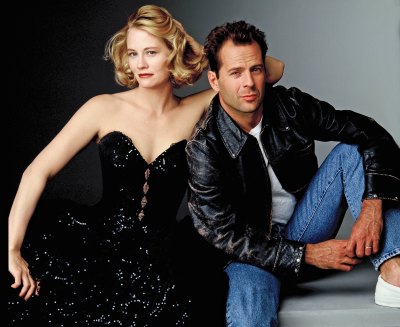When Cybill Shepherd first laid eyes on the script for "Atomic Shakespeare," a 1986 episode of her groundbreaking TV series Moonlighting, which was entirely written in iambic pentameter, she couldn't help but ask creator Glenn Gordon Caron, "Are you serious? Can't we just do a regular television show?"
But here's the thing, Moonlighting was anything but regular. From its boundary-pushing scripts to the drama that unfolded behind the scenes, this show was a whirlwind of creativity and chaos. That's exactly why fans still talk about it fondly, even 30 years after its final episode aired in May of 1989. "I was determined to make every episode as entertaining as possible," Glenn exclusively told Closer Weekly in their latest issue, now available on newsstands. "And I wasn't stopping until I got it right."

Behind the Scenes: Long Hours and Rising Tensions
This high-stakes creative ambition led to some pretty intense moments on set. Cybill Shepherd, the once-fading movie star who found new life as Maddie Hayes, the sharp-tongued owner of the Blue Moon Detective Agency, was blindsided by the sheer intensity of the workload. "Cybill didn't realize how much memorization would be required, how late the scripts would arrive, or just how much of the show she would be in," Glenn recalled. Meanwhile, Bruce Willis, an unknown actor who skyrocketed to fame as her charmingly sarcastic partner, David Addison, embraced the challenge. "Bruce and I were both thrilled by the opportunities we were given," Glenn said, capturing the stark contrast in their reactions.
Read also:Yannick Bisson Height A Comprehensive Look At The Renowned Actors Stature And Career
The Media Feeds the Drama
Of course, the tabloid media couldn't resist diving into the on-set drama. "Cybill and Bruce were unhappy, and it was tough to be around them," Allyce Beasley, who played secretary Agnes DiPesto, revealed at the Tribeca Film Festival premiere of It Takes a Lunatic. The challenges were clear: without scripts delivered on time, preparation became nearly impossible. And when you're in practically every shot, that's an enormous amount of pressure to carry a show that way.

Complications Abound: Pregnancy and Stardom
As if the pressure wasn't enough, things got even more complicated when Cybill became pregnant with twins during the show's fourth season, and Bruce launched a blockbuster movie career with 1988's Die Hard. "He became a huge star, and there was definitely a sense that she was jealous," Glenn admitted. While these stories may have been exaggerated, there's a kernel of truth in every rumor.
Iconic Episodes and Hollywood Legends
Despite the challenges, over four seasons, Moonlighting became an Emmy-winning hit, attracting Hollywood legends like Orson Welles, who introduced the black-and-white episode "The Dream Sequence Always Rings Twice." "He was delightful, but it was obvious he wasn't well," Glenn recalled. "He passed away about a week later, or as my ex-wife likes to joke, I killed him." The show also embraced unique formats, like the musical episode "Big Man on Mulberry Street," which came about after Billy Joel called to say he'd written a song for the show. "


